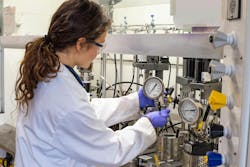University of Oxford Leading Sustainable Chemicals and Materials Manufacturing Research Hub for UK Government
Chemical manufacturing is the UK's second largest manufacturing industry - directly employing more than 140,000 people and delivering turnover exceeding $81 billion annually. However, the greenhouse gas emissions from this global sector currently account for nearly 6% of emissions, which is 2-3 times larger than the global airline industry.
To create a more resilient industry future for this sector, the University of Oxford has been selected to lead a significant UK government research initiative to improve the sustainability of chemical and polymer production.
"'Manufacturing accounts for almost a tenth of the UK’s economic output, but for the sector to keep growing and sustaining jobs nationwide, it has to tackle challenges ranging from reducing emissions to cutting production costs," said Science Minister Andrew Griffith.
"These new hubs will support UK researchers with the cutting-edge facilities they need to help our manufacturers seize the benefits of technologies such as robotics and AI. Harnessing these innovations will cement the UK's position as a global leader in sustainable manufacturing," added Griffith.
Known as the Sustainable Chemicals and Materials Manufacturing Hub (SCHEMA), the project will bring together numerous researchers from across the UK to collaborate with a large consortium of commercial, technology translation, and civic partners.
Led by Professor Charlotte Williams OBE FRS from the University of Oxford's Department of Chemistry, the SCHEMA Hub will focus on transforming the way chemicals and polymers are designed, made, and recycled. This includes supporting the transition from using virgin petrochemicals while redesigning processes and materials to increase recycling rates.
To accomplish this, a key focus will be designing processes that can produce chemicals and polymers from renewable raw materials such as biomass, carbon dioxide, and industrial wastes while integrating renewable energy into process engineering.
These research initiatives will enable sustainable chemicals and polymers to be designed for immediate use within key UK sectors, including electronics, transportation, energy generation and storage, construction, and fast-moving consumer goods.
"It is imperative that the chemical industry reaches net zero emissions and sustainability as so many essential downstream industries depend upon it. Our Hub will be well placed to tackle this difficult challenge by bringing together a very wide range of academic expertise with companies from across the supply chain," said Professor Williams.
About the Author
Breanna Sandridge, Senior Editor
Breanna Sandridge is senior editor for EnergyTech and Microgrid Knowledge, both part of the energy group at Endeavor Business Media.
Prior to that, Breanna was managing editor for Machinery Lubrication and Reliable Plant magazines, both part of Noria Corp. She has two years experience covering the industrial sector.
She also is a 2021 graduate of Northeastern State University (Oklahoma) with a Bachelor's in English.
